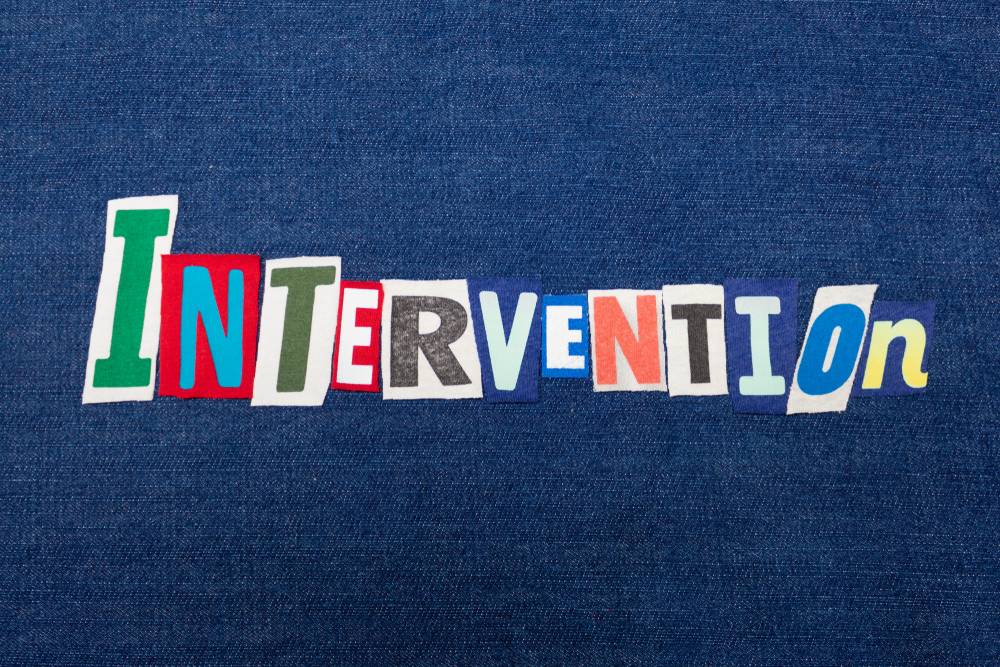Last Updated:
July 2nd, 2025
Timing is a critical factor when trying to help a person struggling with alcohol addiction. However, waiting for too long can be like trying to reconstruct a house using wood that has been burned to ash.
We understand the weight and gravitas of planning an alcohol intervention, and we hope to amplify your efforts to help your addicted loved one break free.
Use this help guide to recognise when outside help is needed, as well as understand practical steps for designing and executing an alcohol intervention.

What is an alcohol intervention?
An alcohol intervention is a carefully planned process where a group of loved ones confront someone about their drinking, intending to encourage them to seek treatment. An intervention is sometimes, but not always, used in relatively desperate times when the addicted person has repeatedly denied the problem or refused help. When drinking has started to affect their health, relationships and day-to-day life, a certain degree of outside encouragement, or force, may be needed.
Interventions are often carried out with the support of a professional, such as a treatment provider, interventionist, or therapist. The intervention draws on the attendance of friends, family, loved ones, or colleagues, who come together to express their feelings constructively. An ideal intervention steers clear of shaming and blaming, instead creating a moment of clarity where the person understands the impact of their behaviour and just how much support and love stems from their dear ones, even when they’re hurting.
The word “intervention” may land on our ears with a degree of weight and gravitas, as it’s often used as a last resort. However, when it’s carried out properly, it can be the turning point that saves a person’s life. An intervention can help a person move from denial or resistance into real considerations of treatment options before the support shown by loved ones inevitably begins to fade.
What are the signs that an intervention is needed?
If you have a family member or loved one who is struggling, you may be considering whether intervention is your best or even your only option. You have likely seen that alcoholism doesn’t always follow a dramatic or predictable path. In many cases, the people around a drinker are the first to notice concerning signs, even before they are ready to admit it.
If you’ve spotted one or more of the following signs, it may be time to consider an alcohol intervention:
- Increased secrecy and lying about alcohol use: They may be hiding bottles or denying drinking when it’s patently clear. Your questions, no matter how direct, may be met with sidesteps and evasiveness, which masks an underlying sense of shame and guilt.
- Missing work or meaningful events due to drinking: When alcohol interferes with their responsibilities, like missing work or family functions, the problem affects more than just their physical health. You may have had times when you needed to cover for them, either in their professional or personal life.
- Escalating health issues or erratic behaviours: Your loved one may be having frequent illnesses, blackouts, mood swings, or sudden outbursts. This may be a sign that alcohol is becoming a deeper issue.
- Failed promises to cut back or quit: Finally, you may have experienced disappointment or heartbreak as promises to cut back were shattered. The same recurring lines may come up, yet no prolonged change is found.
Recognising these signs doesn’t guarantee that an intervention is the only way to get them to stop, but they suggest that outside help is becoming more important. It may be time to take compassionate action as part of an intervention group.
When waiting too long worsens the situation
Almost every person in the circle of a loved one will hesitate to intervene. When you come from a place of love, you can feel like getting through to your dearest people is like treading a tightrope with a precipitous drop waiting on either side for your first misplaced step. It’s often easier to grow passive and confront today’s problem with the strength we are convinced we’ll have tomorrow.
Addiction is a progressive condition. The longer it’s left unchecked, the harder it becomes to reverse its deleterious effects.
Your loved one will develop a stronger tolerance towards alcohol as their brain and body adapt. They’ll grow more likely to engage in risky behaviours like drink-driving or showing up to work drunk. Their mental health will plummet with time, creating a barrier that grows steeper, making it harder to get through to them when you feel like you’re ready.
You don’t need to wait for ‘rock bottom’ to offer the lifeline of intervention. Allegorically speaking, many people begin their recovery journey not because they saw the light but because someone else turned it on for them.
How should I plan the alcohol intervention?
In a broad sense, failing to plan an intervention is planning to fail. An intervention that heats up into accusatory tones or extreme emotional pleas may even make your loved one more defensive than before.
If you’re considering designing your own alcohol intervention, use these steps to get the most out of it:
1. Prepare your statements and goals
Choose the people who should attend the intervention. These should all be people who have seen your loved one’s drinking worsen. Each person should write down their statements, how they feel about the person’s drinking and the ways it is hurting them. Everyone involved should be given enough time to speak. You may also benefit from collectively creating one desired goal or outcome of the intervention, though you may have the final say on this yourself.
Also, use “I” statements that express your concern without blame, such as:
- “I feel scared when I don’t hear from you for days and know you’ve been drinking.”
- “I miss the sober version of you, who laughed and cared without being drunk.”
2. Choose the right time and setting
The time and setting of an intervention are crucial for its effectiveness. It can help to avoid overly personal or emotionally charged spaces, like the sanctity of their home. They may choose to retreat to their own bedroom in avoidance. Instead, think of a quiet, neutral place where your meaning can be conveyed clearly. Once chosen, it’s time to get into it.
3. Deliver and present treatment options
As the intervention unfolds, each person should speak with empathy and care, but people should not have to shy away from sharing what’s in their hearts. One of the best ways to show how much you care is by researching treatment centres and facilities beforehand. Let them know there is a place waiting right now to help them start recovery.
Where possible, include services tailored to alcohol use disorders specifically. If your loved one is overwhelmed or afraid, having a treatment path ready can remove some of their anxieties.
4. End with clear boundaries and “the next step”
The intervention must end with clarity, both in what you hope they’ll choose and in what you will do if they refuse help. Boundaries are not punishments; they are lines you draw to protect yourself and support your recovery in the long run.
For example:
- “If you don’t consider treatment, I won’t continue covering for your absences at work.”
- “If you choose not to get help, I’ll have to step back from our relationship to protect my own health.”
Finish with a next step they can say yes to, even if it’s small. “Will you speak to a counsellor this week?” is better than an open-ended “Will you stop drinking?”
I need help stopping an alcohol addiction ruining my life
If you’re weighing up the option of intervention, you have already taken the first step towards a brighter future for your loved one. Helping them overcome their drinking demons will be difficult, but you don’t have to go through it alone.
Here at Banbury Lodge, we support families through every stage of the recovery journey, including the first step of planning and carrying out alcohol interventions. Our team is ready to give you guidance, treatment plans and comprehensive support to help your loved one break free from addiction.
Whether you’re trying to get through to someone willing to accept help or not, we can help you move forward with your efforts. One phone call may provide the turning point that saves your loved one before addiction becomes too severe. Reach out today.




